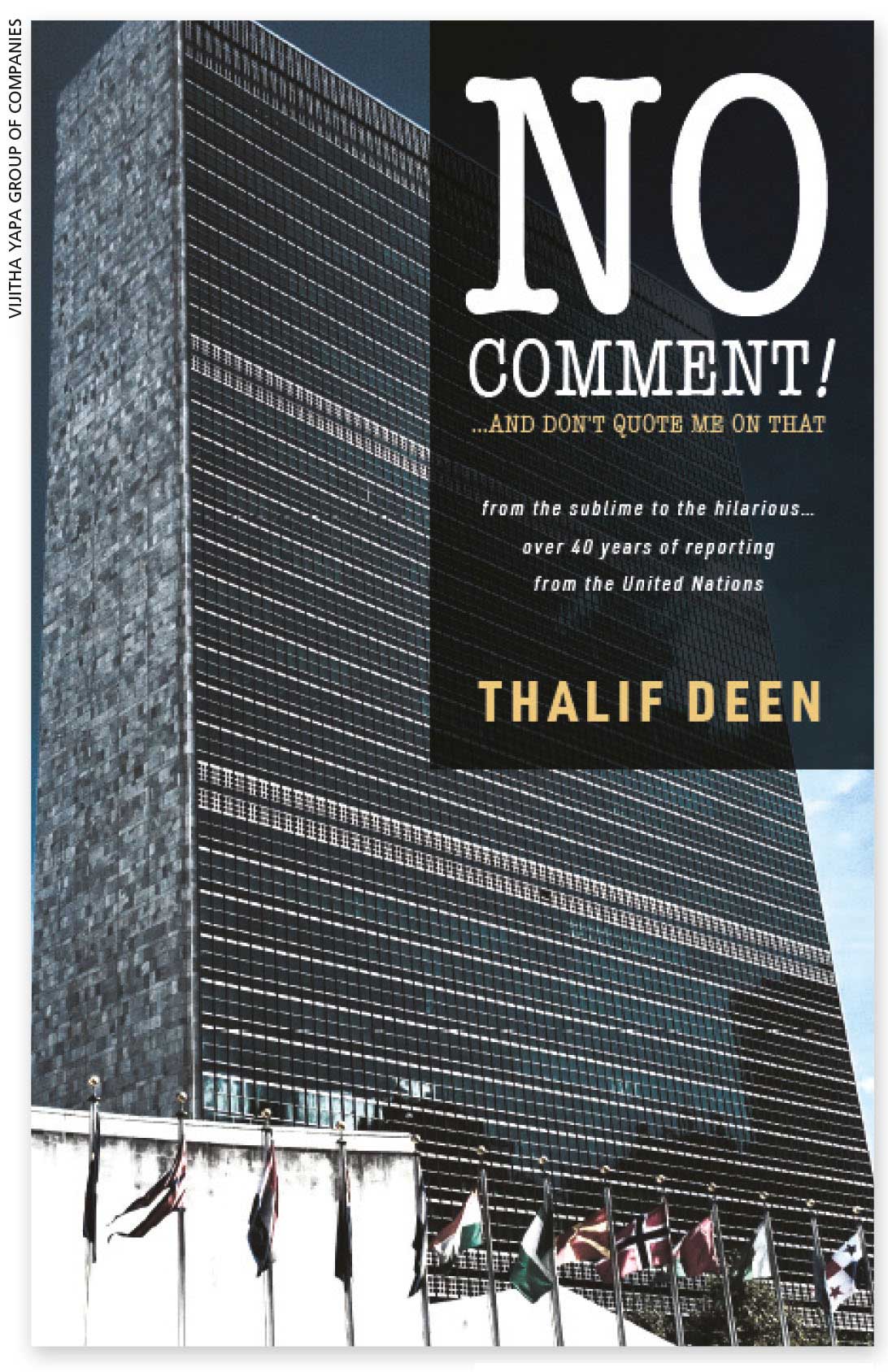BOOKRACK
By Vijitha Yapa
Thalif Deen – Director and Senior Editor, UN Bureau, Inter Press Service (IPS) – is known in Sri Lanka as our man at the UN. Deen was not Sri Lanka’s Permanent Representative there but reported on events as he saw them.
 The United Nations Human Rights Council (UNHRC) voted on Sri Lanka recently and a record number abstained in Geneva. Deen says that at the UN, there are three choices: vote for, against or abstain. But he also cites a fourth option: an urge to rush to the toilet.
The United Nations Human Rights Council (UNHRC) voted on Sri Lanka recently and a record number abstained in Geneva. Deen says that at the UN, there are three choices: vote for, against or abstain. But he also cites a fourth option: an urge to rush to the toilet.
He says the frantic attempt to leave one’s seat vacant takes place whenever an issue is politically sensitive. Perhaps in the case of Sri Lanka too, those who were absent were actually in the toilet.
The book is filled with anecdotes, which provide sparkle to an otherwise dry topic. He recounts how former President J. R. Jayewardene – as the Chairman of the Non-Aligned Movement (NAM) – was asked by an American reporter about nonalignment. JR informed him that there were only two nonaligned countries in the world – viz. the US and the USSR!
When former US Secretary of State Hillary Clinton was informed that despite giving millions of dollars in aid to Pakistan, some Pakistani government officials were secretly supporting anti-American groups, her response was classic: “You can’t keep snakes in your backyard and only expect them to bite your neighbours.”
One of the best anecdotes was the reaction of an Indian minister when a reporter brought in his tape recorder. This was at a time when tape recorders had only recently appeared in the market. He told the reporter to leave the machine outside the room and added: “You are trying to deny me my right to deny what I am going to tell you.”
But even with recorded camera proof, politicians continue to deny their own words if they don’t favour them. Deen cites the advice of a journalism school: “Even if your mother says she loves you, double-check that story.”
Indeed, Sir Winston Churchill once said that “diplomacy is the art of telling people to go to hell in such a way that they ask for directions.”
For journalists, carrying a correction can be a demanding task. There is an anecdote about a US newspaper editor who ran an obituary of an official who promptly phoned the editor from his hospital bed and demanded a retraction, asserting he was alive and kicking!
The editor said they didn’t carry corrections but suggested that the official’s name could be listed in the ‘births’ column the next day…
Corruption and tempting offers abound among diplomats, and Deen records instances of offers of shares in successful companies, Swiss watches and even gifts of exclusive Swiss chocolates in exchange for votes.
Fathulla Jameel, a former Permanent Representative of the Maldives to the UN, is quoted about a reaction to his appeal for funding of some infrastructure projects. One Asian country responded positively but told Jameel that “if there is a vote at the UN and it is not of any national interest to your country, we would like to get your vote.” Deen says that it is development aid with no visible strings attached.
The UN also has had its share of intrigue. There were charges of spying by Americans who had used lip readers to find out what the Russians were saying to each other. Another charge was the use of spying equipment to eavesdrop on phone calls.
One of the most dramatic was when Cuban Minister Che Guevara was speaking in 1964 at the UN and the building came under attack when a bazooka was fired at it. A more bizarre episode was when the CIA was accused of trying to introduce a chemical powder into Fidel Castro’s shoes to make his beard fall off.
Malaysian leader Dr. Mahathir Mohamad is another personality cited by Deen. Referring to the West’s obsession with child labour and sweatshops, Mahathir had noted that concern is shown only when products of highly paid, high living, four day week workers in industrial nations are threatened.
The double standards of the US was evident in Iraq when ex-president Saddam Hussein’s torture chambers in the Abu Ghraib prison continued to operate under the Americans until their activities were exposed. Since the United States was embarrassed, it delayed releasing its report on worldwide abuses of human rights because (as the New York Times noted) “the US has been humiliated.”
I have focussed on the lighter side but the Israeli influence at the UN and pressure brought by Americans on UN officials including its secretary-general are among the areas covered in this delightful book.
It is a must read for those who wish to understand how the UN functions.




